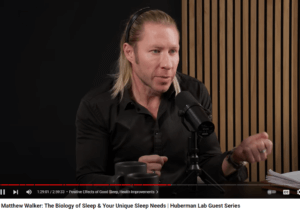
Dr. Peter Attia: Exercise, Nutrition, Hormones for Vitality & Longevity | Huberman Lab Podcast #85
In the realm of human health and longevity, few subjects spark as much interest as the triad of exercise, nutrition, and hormones. The Huberman Lab Podcast episode #85 featuring Dr. Peter Attia dives deep into these topics, presenting a comprehensive view on how these factors contribute to our vitality and longevity. This article aims to dissect one of the episode’s key discussions: the unparalleled benefits of exercise on our health span and lifespan.
The Unrivaled Power of Exercise
“The single greatest efficacy we can point to is exercise,” Dr. Attia remarked during the podcast, underscoring the profound impact physical activity has on our well-being. This statement is not just an observation but a testament to a vast body of scientific evidence indicating that regular exercise is, perhaps, the most effective ‘medicine’ available to humans for prolonging life and enhancing the quality of living.
Exercise: The Cornerstone of Longevity
Exercise is a catalyst for a myriad of beneficial physiological processes. It influences cardiovascular health, metabolic efficiency, and neuroplasticity, making it a critical component of any longevity strategy. What’s particularly fascinating about exercise is its ability to modify the very fabric of our being, from the cellular level to our overall physical and mental performance.
The Mechanisms at Play
The benefits of exercise extend far beyond the obvious. On a molecular level, physical activity stimulates the production of proteins and hormones such as brain-derived neurotrophic factor (BDNF), which plays a crucial role in brain health and cognitive function. Moreover, exercise enhances insulin sensitivity, reducing the risk of metabolic diseases, and promotes cardiovascular health by improving blood flow and reducing inflammation.
The Science of Movement
The discussion in the podcast further delves into the science of movement, highlighting the importance of both resistance and aerobic training. Dr. Attia emphasizes the significance of strength, not just muscle mass, in predicting health outcomes. Strength training, particularly, has been shown to have a profound effect on reducing all-cause mortality risk, underscoring the need for a balanced exercise regimen that includes both strength and cardiovascular elements.
Aerobic Exercise and VO2 Max
Aerobic exercise, on the other hand, has a direct impact on increasing VO2 max, a measure of cardiovascular endurance and efficiency. Individuals with higher VO2 max levels have been shown to have significantly lower risks of all-cause mortality, further illustrating the direct correlation between exercise and longevity.
Final Thoughts
The conversation between Dr. Andrew Huberman and Dr. Peter Attia is a compelling exploration of the interplay between exercise, nutrition, and hormones in achieving a long, healthy life. By focusing on the scientific underpinnings of exercise’s benefits, we are reminded of its unrivaled position in the hierarchy of health interventions. It’s a clarion call for incorporating regular, varied physical activity into our lives, not just for the sake of living longer but for enriching the quality of every year we gain.
As we move forward, embracing exercise as a foundational pillar of health offers a promising path to not just extending our years but ensuring those years are lived with vigor, vitality, and joy.





